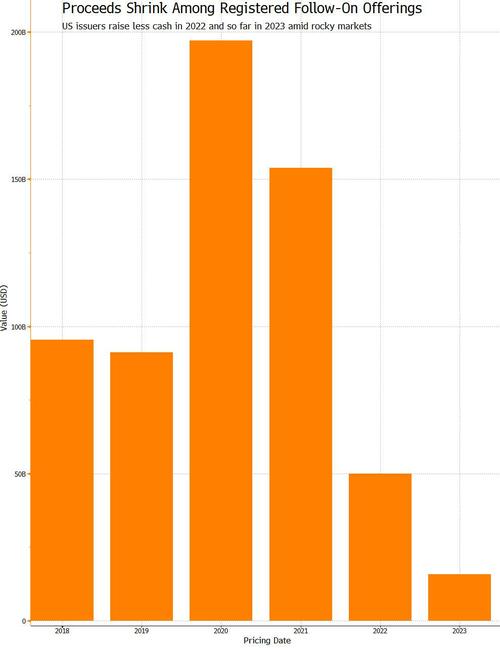PIPEs Emerge As Clever Funding Tool In Dire Markets
By Drew Singer, Bloomberg Equity Capital Markets reporter and strategist
Private investments in public equity are growing in popularity as rocky markets force boardrooms to get increasingly creative in order to raise the cash they need.
A year of volatile markets has limited the ability of US-listed firms to do traditional follow-on offerings, opening the door to so-called PIPEs as an alternative. The latest include a $200 million raise by Legend Biotech Corp., a $250 million sale by Enviva Inc. and a $10 million deal by Stronghold Digital Mining Inc.
The strategy is spreading after a significant reduction in US public capital markets activity that started last year continues to limit companies’ access to cash, Wilson Sonsini Goodrich & Rosati said in a report published April 26.
“We expect that these market challenges, along with the additional financing difficulties resulting from high-profile bank failures during the first quarter of 2023, will continue to complicate capital raises for the immediate future and companies may increasingly turn to PIPEs as a way to meet their financing needs,” it says.
Behind closed doors, conversations around PIPEs have picked up over the last two years as equity valuations dropped but corporate cash needs didn’t, said Kevin Eisele, managing director for equity capital markets at William Blair. In 2022, companies raised $8.8 billion using PIPEs, with most of the issuers coming from the life sciences industry, according to the Wilson Sonsini report.
Meanwhile, rocky markets and lower valuations have been stifling demand for traditional, registered follow-on offerings. US-listed firms have raised $17.7 billion through registered stock offerings this year as of May 15, down 78% from the same span of 2021 but roughly the same as at that point in 2022, according to data compiled by Bloomberg.
The fully confidential nature of PIPE transactions gives issuers more flexibility to share information under nondisclosure agreements, Eisele added. It’s become increasingly common for secrets to be shared ahead of equity raises, but the strategy is less straightforward with the registered stock sales.
Another reason PIPEs are becoming more popular is issuers’ needs to structure financings in ways that cater to the demands of specific parties. PIPEs can involve tranches and the sale of securities besides common shares, and they can more easily get priced at a premium to market levels, for example.
“Investors love these situations because they get guarantees around their allocation and it’s more of a negotiation directly between the issuer and the investors,” Eisele said. “It ultimately falls to the level of conviction that investors have under specific circumstances, because they’re going in mindful that they’ll be locked up for a period of time.”
In recent years, PIPEs emerged as a common component of reverse mergers with special purpose acquisition companies. But the approach lost its luster as investors soured on the once-booming business of SPAC deals.
The latest use of PIPEs is also a break from what was done in prior market downturns, when the strategy was typically limited to those turning to technicals-focused investors rather than those who endorse the company’s fundamentals.
“PIPEs were always sort of viewed negatively,” Eisele said. “It’s become a really viable alternative for a lot of issuers and its been very legitimized as a great way for issuers to get fundamental investments when there’s a strong level of interest from those investors and opportunities to structure and tranche financings.”
Tyler Durden
Tue, 05/16/2023 – 13:05
Zero Hedge’s mission is to widen the scope of financial, economic and political information available to the professional investing public, to skeptically examine and, where necessary, attack the flaccid institution that financial journalism has become, to liberate oppressed knowledge, to provide analysis uninhibited by political constraint and to facilitate information’s unending quest for freedom. Visit https://www.zerohedge.com
